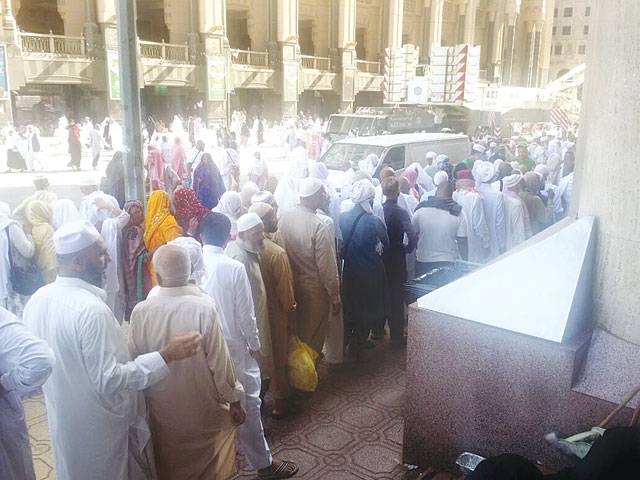MAKKAH - Many Pakistanis on Umrah pilgrimage are bringing a bad name to their country by their activities during their stay in Saudi Arabia. All such people are supposed to be resourceful enough to bear all their expenses, but, unfortunately, thousands of them live on charity food and are involved in begging, which is against the spirit of holy mission.
In Makkhah, there are about a dozen food points outside King Abdulaziz Gate and King Fahd Gate of Masjid Al-Haram. A large number of Pakistani pilgrims line up in front of these outlets to get free food, or sabeel, distributed as Sadqa after Zohr and Isha prayers. Although nationals from other countries are also among the recipients, an overwhelming majority hails from the sole nuclear power of the Islamic world. They can be easily recognised from their faces or shalwar kameez dresses.
Most of these people either belong to Sindh or South Punjab.
It has also been observed that male pilgrims send their spouses, sisters or other female relatives to join these queues as they receive the food packets rather easily.
Maulana Rasheed Mian of Jamia Madnia, Ravi Road, Lahore, says Umrah is not mandatory (Wajib) and Haj has been enjoined upon only those who have the resources to bear all expenses.
Talking to The Nation, he said that asking for Sadqa (Sabeel) or accepting it is against self-respect which is something Islam wants everyone to uphold in all situations.
People proceeding to KSA to perform Umrah should not join the lines for Sabeel (sadqa) foods, he said.
As for people sponsoring the poor to perform Umrah, he said such elements should bear the full expenditure so that the sponsored ones don’t have to beg or stand in lines for sadqa food.
The writer is of the considered opinion that the government should spare some time from its political wrangling at home and think of some measures to discourage this trend in a country where millions from other countries are there to watch the beggars’ line many a time every day.
Pakistani missions in KSA can be tasked to keep an eye over the people whose activities are damaging national prestige. And those seen in charity lines should be proceeded against through some mechanism to be evolved for the purpose.
Those proceeding on the holy journey should be asked to give an undertaking that they would bear all their expenses without involving themselves in begging or charity foods. And those who violate the undertaking should be awarded exemplary punishment.
POOR WORKERS
Pakistanis, especially those belonging to working class who paid heavy amounts to get jobs in the kingdom, are facing a number of problems there as the Saudi government is sending the foreigners back to their countries. Such people can’t afford to come back to Pakistan as they have no jobs waiting for them and don’t have resources to start their own businesses.
These people are trying to stay back by all means.
Some such people are working illegally with their Saudi employers, who exploit them fully knowing well that they can’t raise voice against them.
A worker from South Punjab said he had not been paid for about two years. Others are paid much less than market rates.
Some Pakistanis have changed their “jobs”. They have purchased wheelchairs and help the disabled or sick people from Pakistan perform Umrah, and in return receive compensation. While Saudi nationals performing the same job receive up to 150 Riyals for Tawaf and Sa’ee, a process that be completed in a couple of hours, Pakistanis agree even to 50 percent of this amount. To facilitate their clients they pick them from their residences and drop them there, a facility that can’t be expected from the Saudi handlers.
Since the wheelchair pushers have to wear Ehram to enter Mataf (the area where Tawaf is performed) they are taken as Umrah performers or their relatives, which is not the case. Ehram is used just to hide their illegal status.
MONEY-SAVING MEASURES
Hundreds of thousands of Pakistanis perform Haj and Umrah every year. More than 761,000 Pakistanis performed Umrah in 2016 alone.
Collectively, they have to spend huge amounts to get accommodation in hotels of various categories or buildings. And since Pakistan is facing serious economic problems at present, the government should take urgent measures in various sectors to save as much as it can. If the government hires some buildings near Masjid Al-Haram in Makkah and Masjid-i-Nabvi in Madinah and makes it mandatory for all Haj/Umrah pilgrims to stay there, the guests will get better facilities at very reasonable rates. If the charges at these places are higher the beneficiary will be the state of Pakistan.
Pakistan Houses in the two holy cities can’t accommodate all guests.
And if the government also makes some arrangements to provide food to all guests staying at such places, the profit going to the government will be much higher.
The government will be doing a great service by setting up currency exchange centre at these places.
The government must ban the purchase of any item from KSA or any other country which is available at home. This single step will save the country huge amounts. Those going for Haj and Umrah should be directed to focus on religious obligations rather than purchasing unnecessary items.






